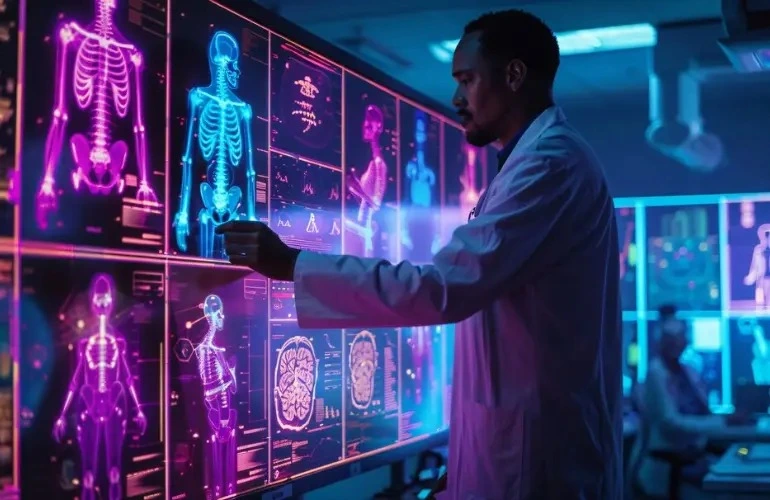Artificial intelligence (AI) is revolutionizing various industries, and one of the most impactful areas is healthcare. The benefits of artificial intelligence in healthcare are numerous, offering improvements in diagnostics, patient care, and administrative tasks. In this article, we will explore how AI is transforming healthcare and why it’s becoming indispensable in modern medical practices.
Understanding the Benefits of Artificial Intelligence in Healthcare
Artificial intelligence in healthcare refers to the use of algorithms and software to analyze complex medical data. AI systems are designed to assist healthcare professionals in making better clinical decisions, improving patient outcomes, and increasing the efficiency of healthcare services. But how exactly does AI achieve these benefits? Want to know about Is Artificial Intelligence Capitalized?
Enhanced Diagnostics and Early Detection
One of the most significant benefits of artificial intelligence in healthcare is its ability to enhance diagnostics. AI-powered tools can analyze medical images, such as X-rays and MRIs, with remarkable accuracy. For instance, AI algorithms can detect tumors, fractures, and other abnormalities that the human eye might miss.
Moreover, AI can analyze vast amounts of medical data to identify patterns and predict the onset of diseases. This capability is particularly valuable in the early detection of conditions like cancer, where early intervention can be life-saving. Thus, AI improves diagnostic accuracy and plays a crucial role in preventative healthcare.

Personalized Treatment Plans
Artificial intelligence also contributes to the development of personalized treatment plans. By analyzing a patient’s genetic makeup, medical history, and other factors, AI can help doctors tailor treatments to the individual needs of patients. This approach, known as precision medicine, enhances the effectiveness of treatments and reduces the risk of adverse reactions.
For example, AI can assist oncologists in determining the most effective chemotherapy protocol for a cancer patient, considering the patient’s specific genetic profile and the characteristics of the tumor. This personalized approach ensures that patients receive the best possible care, tailored to their unique circumstances.
Improved Patient Care and Monitoring
Another area where artificial intelligence shines is in patient care and monitoring. AI-powered devices and applications can monitor patients’ vital signs in real-time, alerting healthcare providers to any abnormalities. This constant monitoring is especially beneficial for patients with chronic conditions, as it allows for timely interventions and reduces the likelihood of complications.
Additionally, AI can help in managing patient data, making it easier for healthcare professionals to access and analyze medical records. This streamlined process not only saves time but also reduces the chances of errors, enhancing overall patient safety and care quality.
These advancements highlight the remarkable benefits of artificial intelligence in healthcare, transforming how we approach patient care and improving outcomes significantly.
Streamlining Administrative Tasks
Administrative tasks in healthcare can be time-consuming and prone to errors. However, artificial intelligence can automate many of these tasks, freeing up healthcare professionals to focus more on patient care. For example, AI can assist in scheduling appointments, managing billing, and maintaining electronic health records.
Moreover, AI-powered chatbots can handle routine inquiries, providing patients with quick and accurate responses. This not only improves the patient experience but also reduces the workload on administrative staff, contributing to a more efficient healthcare system.

Ethical Considerations and Challenges
While the benefits of artificial intelligence in healthcare are impressive, it’s important to acknowledge the ethical considerations and challenges associated with its use. Issues such as data privacy, algorithmic bias, and the need for regulatory oversight are critical aspects that must be addressed to ensure the responsible and equitable deployment of AI technologies in healthcare.
For example, ensuring that AI systems are transparent and that their decision-making processes can be understood and audited is crucial for building trust among healthcare providers and patients. Additionally, protecting patient data from breaches and misuse is a top priority, as healthcare data is highly sensitive and personal.
FAQs
What are the main benefits of artificial intelligence in healthcare?
AI in healthcare enhances diagnostics, personalizes treatment plans, improves patient care, and streamlines administrative tasks.
How does AI improve diagnostics in healthcare?
AI analyzes medical images and data, detecting diseases and abnormalities that may be missed by humans, and predicting disease onset.
Can AI help in personalized treatment plans?
Yes, AI can analyze a patient’s genetic data and medical history to create tailored treatment plans, enhancing treatment effectiveness.
What ethical challenges does AI in healthcare face?
Ethical challenges include data privacy, algorithmic bias, and the need for transparent and accountable AI systems.
How does AI contribute to patient care and monitoring?
AI-powered devices monitor vital signs in real time, alerting healthcare providers to abnormalities and ensuring timely interventions.
Conclusion
In conclusion, the benefits of artificial intelligence in healthcare are profound, offering enhanced diagnostics, personalized treatments, improved patient care, and streamlined administrative tasks. As AI technology continues to advance, its potential to transform healthcare will only grow, providing even more opportunities to improve patient outcomes and the efficiency of healthcare services.
However, it’s crucial to address the ethical and regulatory challenges associated with AI in healthcare to ensure that these benefits are realized in a responsible and equitable manner. By doing so, we can harness the full potential of AI to revolutionize healthcare for the better.
For further reading on the ethical considerations and potential of AI in healthcare, you can visit this resource or explore the latest developments in AI and healthcare.











